In a talk given at this year’s 4×4 event series in Manchester in July, social geographer Danny Dorling argued that the divide in our society is largely as a result of housing. Here we publish an adapted transcript of his talk.
It is 160 years ago (that’s only your great great great grand parents ago) that this city of Manchester where we are today had a housing crisis. On this exact spot – or more likely a floor below us – people were living in jerry built housing that was so bad that life expectancy fell below 25 years. The reason for this crisis was immigration. So yes immigration can cause a housing crisis (although not the one that we have at present). In the 1840s Manchester was sucking people into its mills, many fleeing from famine in Ireland. Combine this with badly built housing and you have a housing crisis, the same kind of crisis that is happening in slums and shanty towns around the world. Manchester did this first. But our current housing crisis has nothing to do with immigration.
You can also get a housing crisis if something destroys your housing – a flood, a fire or bombing as happened in the Second World War. In London, the middle-class in Notting Hill fled when the V2 bombs came – they don’t like to talk about it because it sounds a bit cowardly. People who were bombed out in the East End moved into Notting Hill, which is why Notting Hill became poor, which was then why the West Indians were able to move there in the 50s and 60s. It has taken a long time for the middle classes to get Notting Hill back, for it to gentrify back to the social position it held in London a century ago. Bombing, floods, fire and plague can cause a housing crisis. But our current housing crisis is not the result of bombing or floods.
The third way to get a housing crisis is to have lots of babies as we did in the 1960s, leading to ‘Cathy Come Home’. There weren’t actually that many babies then, just over two per couple. Although those couples were often themselves the result of the post-World War One and Two baby booms. But in any case, our current housing crisis is not due to babies because, since the 1960s, the birth rate has fallen below the fertility replacement rate.
No, the current crisis is due to one thing and that is greed. While we may not have built as many homes as we want in recent years, we have extended the existing housing stock to such an extent that the number of rooms per person has gone up. The 2011 census measured the most rooms per person that the UK has ever had. We have never had as much housing as we have now. We should have enough housing for everyone, it’s just that more housing is under-occupied and more and more is owned by private landlords who rent it to whomever can pay the highest rent rather than, as in the past, allocated more by social landlords on the basis of need. In the past, councils allocated houses on the basis of household size, whereas now in London you see single professionals living in maisonettes designed for four or five people.
Or, encourage people to have a flat in Manchester during the week and a house on the coast that they might go to at the weekend. In both scenarios you rapidly run out of houses and flats. This is the type of housing crisis we have. This is a great place to be, because the solutions aren’t that difficult. We don’t need to build huge numbers of houses, we don’t need to deal with the level of immigration that Manchester once experienced, we don’t need to house lots of families having babies, we just have to more fairly distribute the housing stock that already exists.
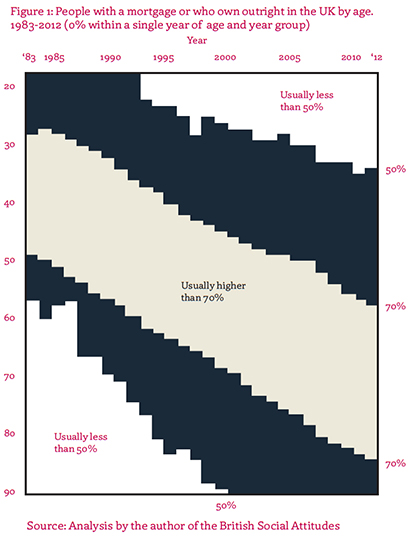
I’m very proud of the graph (above) because it’s the only thing I have ever got in the Telegraph newspaper. Even the relatively well-off people who work for the Telegraph realise that there is a housing crisis because they can’t afford to buy a house in London. The diagonal stripe on the graph shows the generation who were able to buy a house in the ‘home owning democracy’ of the 1980s. The bottom triangle shows the end of the old rented sector, both private and council housing, while the triangle at the top shows the new renters, many of whom will always rent, paying money to enrich somebody else. We don’t need to live in a society where everyone can buy a house. In most European countries buying is a lifestyle choice; if you like DIY you buy, if not you rent – but more than half the population choose the latter. However to create such a society we need to deal with the housing crisis because at present it means that too much of our national wealth is tied up In property, much of it owned by a small percentage of the population creating huge inequity.
I created the next graph (below) because I got sick of politicians saying there is no alternative to the way we’ve been doing things in this country. It shows the proportion of GDP spent on public services and the thick line is the UK. Apart from the naughty spending by Labour in 2002-4 (particularly naughty because much of it was spent paying for war in Iraq) the UK spends far less on public services than countries like Finland, France, Denmark or Germany. We would have to spend an extra billion pounds a week on our Health Service to have the spending levels that the Germans have. How do they do this? They tax rich Germans. But we are told ‘oh no we’ve got to compete, it will be economically disastrous, you’ve got to have low taxes’. But all those other countries in Europe shown below (apart from Ireland) have higher taxes, they’re not basket cases. And Ireland is not in a good economic position itself right now. The European Union have ordered it to tax companies like Apple properly because Ireland has been undercutting average continental tax rates, not just failing to tax its own rich.
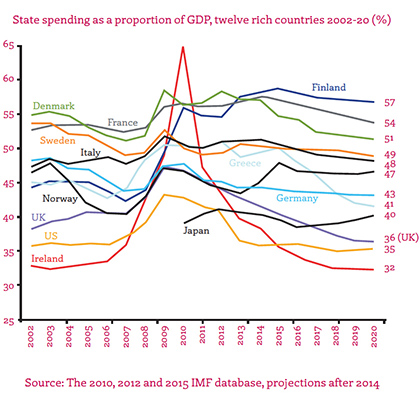
The Brexit vote has taught us something that we didn’t know. Nobody knew this, nobody knew that a narrow majority would vote to leave. The markets didn’t know it, otherwise they would have behaved differently. The political commentators didn’t know it, the opinions formers didn’t know it, not a single person like me knew it, otherwise we would have sat down and written a book and put it out the day after and make an absolute fortune. We’ve discovered that amongst us there is a level of fear and anxiety, and that the ‘metropolitan elite’ missed this completely. Some people may have wanted to make Britain to be great again or didn’t like the colour of people’s skin, but I don’t think this was it for most. For most people who voted to leave they were voting against business as usual in the UK, against there being no change.
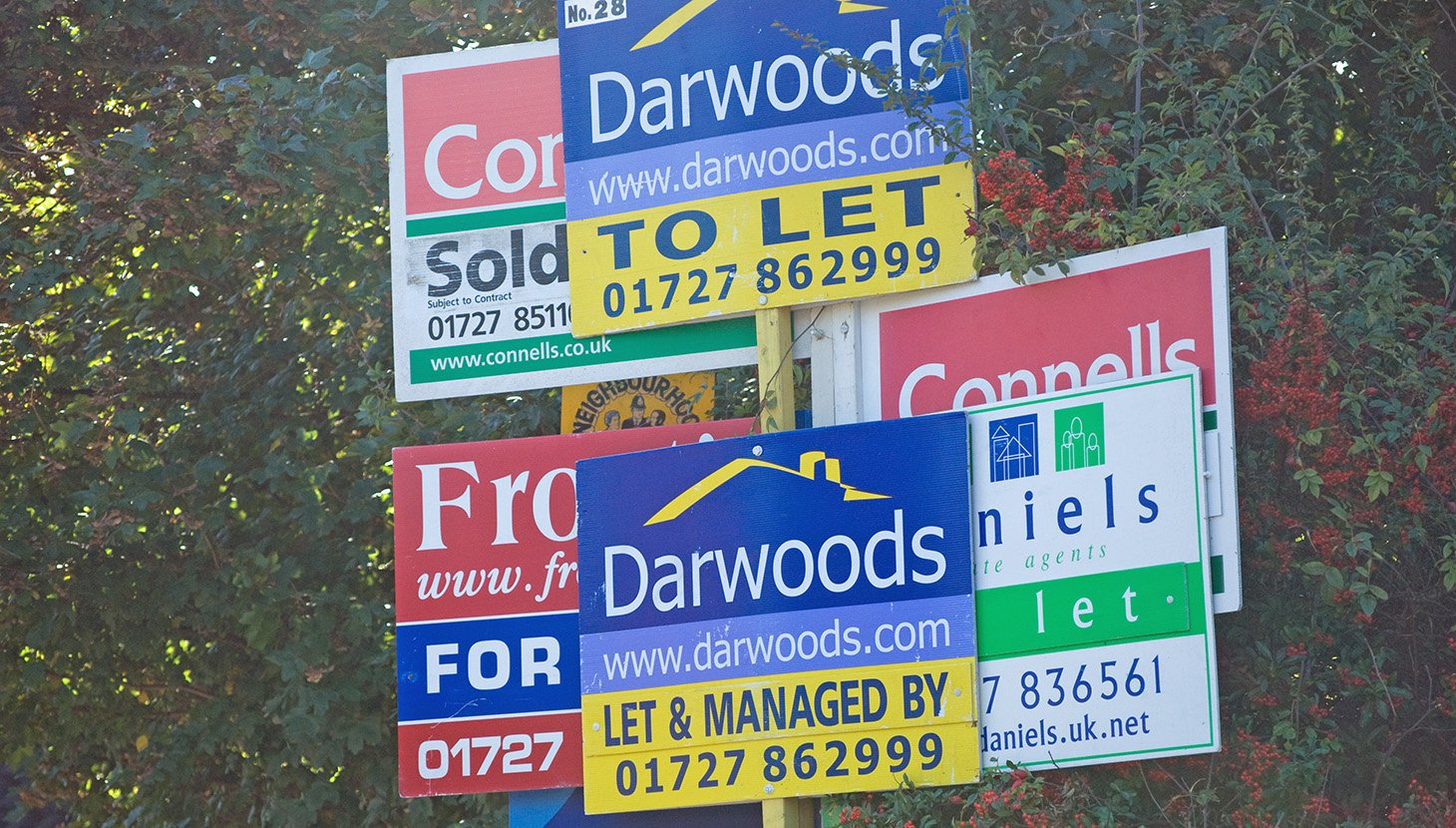
ph. Stephen GG via Flickr
On the day of the Brexit vote statistics were released showing that an extra 52,000 people died last year, the mortality rate rose by 9% compared to the year before. This was the planned publication date for that statistical release, but you couldn’t have chosen a better day to bury the news and it wasn’t due to flu that mortality rose so much. It was when I saw that the rise in mortality was so high that I first thought about what the government had been doing to monitor health and wellbeing in the UK. Let’s put that together with happiness data, I thought. You will remember David Cameron’s happiness index? He introduced it when first elected and a key part of the data relates to health. I had forgotten about this until recently, but the data has been collected annually for many years and it shows is that year on year since 2011 the happiness measure has been getting worse. This all fits with the numbers of isolated elderly people increasing and their circumstances getting worse, with the slashing of visits by adult social workers to people who are frail, with the cuts to Meals on Wheels, with the cuts of to Pension Credits, it fits with the growing sense of pessimism. No wonder the mortality rate has risen and that it was the elderly who voted for Brexit – who voted for anything but this. For several years the elderly had been telling us that their lives were getting rapidly worse and we did not listen because we thought the triple lock on pensions was a great help. It is of little help when you fall down the stairs, break your hip, and the support services are no longer adequate. It is of little help when you get dementia and care homes are underfunded and short-staffed by poorly paid staff.
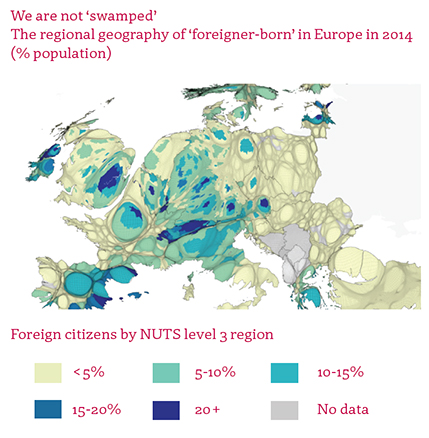
But it’s not just the elderly. I used to work at the University of Sheffield and every year we would put up a list of courses. We had 15 courses including one called TBA (to be announced), which turned out to be the most popular. The university students picked it more than any other course because they didn’t like what was on offer, just as happened with Brexit. Lots of people in London voted for the status quo as did the residents of Oxford and Cambridge and indeed Manchester and Liverpool (but not Sheffield). But most of the country voted for “anything but this”. Most Leave voters live in the south of England and almost 60% are middle-class. I have been saying for years that the growing divide in our country will lead to trouble ahead, such as the riots we had a few years ago. However, Brexit could only have happened because the divide has grown to include the middle class. Even people who are themselves reasonably well off worry about their kids and grandkids being subject to the vagaries of the rented housing market (families living in private rented property in London move on average once every three years).
The divide that has opened up in society is largely about housing. Between 2004 and 2014, private landlords saw their wealth increase by £434bn and yet they make up only two per cent of the population. During the credit crunch even quite well paid people couldn’t get a mortgage so landlords bought more houses and the divide between those who own property and those who have to earn a living widened. The good news, however, is that the wealth is still in the country, because property can’t easily be moved. The problem we have is distribution.
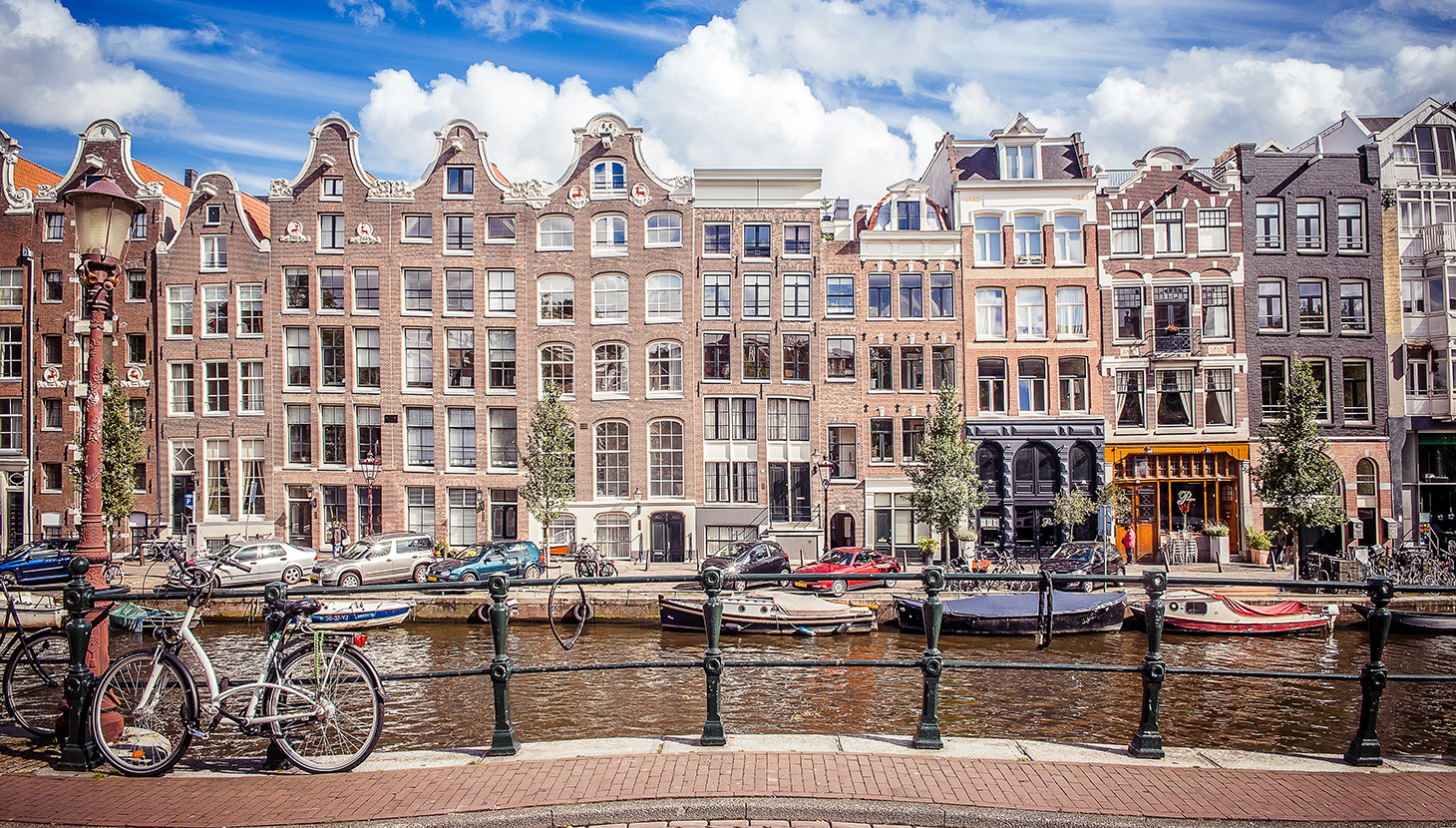
Amsterdam housing ph. Andrés Nieto Porras via Flickr
So we don’t have a problem of immigration as the map above shows. Many parts of Europe have high levels of immigration and often the immigrants are us Brits. Paris has lots of immigrants as does Ireland and London. As the Brexit vote shows, the more immigrants you have, the less you worry about immigrants. And as the map also shows, most of the UK has very few immigrants, by European standards. So we didn’t have a problem with immigrants. We did have a problem with innumeracy. We did have a problem understanding what is normal on this continent. We did have a problem of not realising that housing is expensive because of the way it is owned and occupied. We did have a problem of not realising who actually builds our houses, where the labour comes from, where the bricks come from. We did have a problem understanding who staffs our care homes and our hospitals. But the great news is that we are all going to find this all out. People like me are not going to need to explain why immigrants are an asset because it will start to become painfully obvious.
So what’s to be done with the housing market? Let’s start with this rather desirable house in Amsterdam (similar to that shown above) where property records have been kept since it was built. In 1669 it sold for 28,000 guilders, about half a million Euro today. It peaked in value in 1778 when Amsterdam was the most expensive place on the planet, but since then its value has fallen in real terms for 250 years. Currently the most expensive place on the planet is London. The average semi-detached house in the UK is today selling for £250,000.
In Manchester, Sheffield, Liverpool it is slightly lower than this, in Oxford it’s £460,000 and absolutely cripples the city. In Westminster it is £4m and in Chelsea a whopping £7m and still people can’t imagine prices in London falling, despite them being so high – maybe because they are so astronomically high? Well they have fallen post-Brexit. If you factor in the fall in house prices and property investment funds you will find that Boris Johnson has done more than any Labour Prime Minister to reduce the wealth of the Sunday Times 1000. The problem is that this wealth has not been redistributed, it has evaporated.
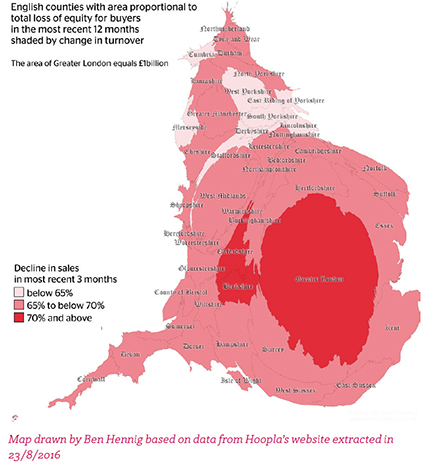
We probably don’t therefore need to build that many new homes, especially now that we will have put off people coming to the UK by how we voted, whether we enact immigration controls or not. We need some modest building in London and Oxford where there is positive net migration but we are likely to see migration rates fall post-Brexit (it falls when the economy does badly as confidence falls) and in many places we have all the homes that we need. We do need to repeal the 1988 housing act that allows people to be evicted with only two months notice and allows landlords to charge such high rents. We do need rent controls if we are going to have rented housing as a real alternative to home ownership. We also need a right to sell – something that exists everywhere in the UK other than in Northern Ireland but has only been used by a few thousand people so far – where people in difficultly can ask to become social tenants and the house is given back to the bank and loaned to a housing association but the family can keep living there. A private home becomes social housing. We do need to raise more money to spend on decent public services and the best way to do this is to tax wealth held in property.
This is not radical; we could go a long way simply by adopting the property taxes they have in New York – especially for London. All this would help prevent a future speculative housing price boom.
Danny Dorling is a British social geographer and is the Halford Mackinder Professor of Geography of the School of Geography and the Environment of the University of Oxford.

Hi Danny,
think you raised some interesting points and perspective Danny. I don’t think it’s the whole causation but I think it hasn’t helped the situation. Great article though. Thanks.
[…] It may well be narrowly true that there are enough homes, or rooms, for everyone in the country, as Danny Dorling has long argued, it’s just that many of them are in the wrong place or occupied by too few […]